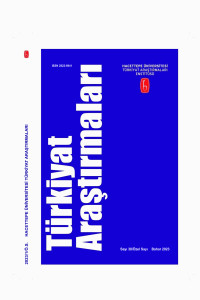Öz
Divan edebiyatında birbirine âşık iki kahramanın âşık olma serüvenleri, karşılaştıkları zorluklar, kavuşmak için verdikleri mücadeleler gibi uzun soluklu hikâyeler mesnevi nazım şekliyle yazılır. Bu mesnevilerde asıl konu aşk olsa da şair çeşitli konulardaki düşüncelerini ve dünya görüşünü okuyucuya aktarmak için eserinde kendisine alan açar. Şairin kendine ait düşünceleri çoğu zaman mesnevilerin giriş ve sonuç bölümlerinde bulunur. Bu bölümlerin yanı sıra asıl konunun anlatıldığı bölümde de kimi vesilelerle şairler kendi seslerini duyururlar. Anlatılan aşk hikâyesindeki kahramanların nezdinde iyi bir hükümdarın özelliklerinin ve iyi bir vezirin sahip olması gereken yeteneklerin yanı sıra kadınların ailelerine ve çocuklarına karşı sorumlulukları gibi konularda fikirlerini belirterek okuyucuyu yönlendirmeye çalışırlar. Bunu kimi zaman hikâyesini anlatmaya başladığı kahramanın özelliklerinden bahsederek kimi zaman da kahramanda olması gereken bir özelliği ona nasihat ederek yaparlar.
16. yüzyıl şairlerinden Fuzûlî’nin Leylâ vü Mecnûn, Taşlıcalı Yahyâ’nın Yûsuf u Zelîhâ, Celîlî’nin Hüsrev ü Şîrîn, Lamiî’nin Vâmık u Azrâ ve Hamîdî’nin Hurşîd ü Hâver isimli mesnevilerinde kadın kahramanlar âşık oldukları, sevgiliden ayrı düştükleri ya da evlendikleri zamanlarda yine hikâye kahramanı olan bir büyükten nasihat alırlar. Bu nasihatler hem eseri yazan şairin hem de eserin yazıldığı dönemin kadına bakışını yansıtması bakımından dikkat çekicidir.
Bu çalışmada şairlerin adı geçen mesnevilerinin kadın kahramanları Leylâ, Zelîhâ, Şîrin, Azrâ ve Hurşîd’den aşka düşen ya da evlenmeye hazırlanan genç bir kadın olarak hangi konularda nasıl davranmasını bekledikleri üzerinde durulacaktır.
Anahtar Kelimeler
Aşk mesnevileri nasihat Leylâ ve Mecnûn Yûsuf u Züleyhâ Hüsrev ü Şîrîn Vâmık u Azrâ Hurşîd ü Hâver
Kaynakça
- Ayan, G. (1998). Lâmi’î Vâmık u Azrâ (İnceleme-Metin). Ankara: AKM Yay.
- Çavuşoğlu, M. (1979). Yahyâ Bey Yûsuf u Zelîhâ (Tenkitli Basım). İstanbul: İÜ Edebiyat Fakültesi Yay.
- Doğan, M. N. (2008). Fuzulî Leylâ ve Mecnûn (Metin, Düzyazıya Çeviri, Notlar ve Açıklamalar). İstanbul: Yelkenli Yay.
- Eren Kaya, F. (2018). Hamîdî Hurşîd ü Hâver (Analysis-Facsimile-Critical Text) (C. II). Harvard Üniversitesi, Yakın Doğu Dilleri ve Medeniyetleri Bölümü.
- Kazan, Ş. (1997). Hâmidî-zâde Celîlî Hayatı, Eserleri, Edebî Kişiliği ve Husrev ü Şîrîn Mesnevisi (İnceleme-Tenkitli Metin) (Basılmamış Yüksek Lisans Tezi). Süleyman Demirel Üniversitesi, Sosyal Bilimler Enstitüsü. Isparta.
- Mengi, M. (1991). Divan Şiirinde Hikemî Tarzın Büyük Temsilcisi Nâbî. Ankara: AKM Yay.
- Tökel, D. A. (2009). Bir Bildungsroman Olarak Leylâ vü Mecnûn Mesnevisi. H. Koncu ve M. Çakır, (Ed.), Bu Alâmet ile Bulur Beni Soran içinde (ss. 179-192).
- Yeniterzi, E. (2007). Anadolu Türk Edebiyatında Ahlâkî Mesneviler. Türkiye Araştırmaları Literatür Dergisi, 10(5), 433-468.
Öz
In divan literature, long-term stories such as the adventures of two heroes who fall in love with each other, the difficulties they face, and their struggles to be reunited are written in the form of masnavi nazim. Although the main subject in these masnavis is love, the poet spares a place for himself in his work to convey his thoughts and worldview on various subjects to the reader. The poet's own thoughts are often included in the introduction and conclusion sections of the masnavis. In addition to these sections, the poets convey their thoughts on some occasions in the section where the main subject is explained. Through the heroes in the love story told, they express their opinions on issues such as the characteristics of a good ruler, the abilities that a good vizier should have, the responsibilities of women to their families and children, and they try to guide the reader on these issues. Sometimes they do this by talking about the existing features of the hero whose story he started to tell, and sometimes they do this by giving advice to him about a new feature that a hero should have.
In our study, five different love masnavis written by different poets in the 16th century was examined. In Fuzûlî's Leylâ and Mecnûn, Taşlıcalı Yahyâ's Yûsuf and Zelîhâ, Celîlî's Hüsrev and Şîrîn, Lamiî's Vâmık and Azrâ and Hamîdî's Hurşîd and Hâver the heroines get advice from an elder who is also a hero of the story when they fell in love or separated from their lovers. These advices are remarkable in terms of reflecting both the view of the poet who wrote the work and perception of women at the time the work was written.
In this paper, it will be focused on how the poets of the 16th century expect the female protagonists of the aforementioned masnavis Leylâ, Zelîhâ, Şîrîn, Azrâ and Hurşîd to behave as a young woman falling in love or preparing to marry.
Anahtar Kelimeler
Masnavis of love advice Leylâ vü Majnûn Yûsuf u Zelîhâ Hüsrev ü Şîrîn Vâmık u Azrâ Hurşîd ü Hâver.
Kaynakça
- Ayan, G. (1998). Lâmi’î Vâmık u Azrâ (İnceleme-Metin). Ankara: AKM Yay.
- Çavuşoğlu, M. (1979). Yahyâ Bey Yûsuf u Zelîhâ (Tenkitli Basım). İstanbul: İÜ Edebiyat Fakültesi Yay.
- Doğan, M. N. (2008). Fuzulî Leylâ ve Mecnûn (Metin, Düzyazıya Çeviri, Notlar ve Açıklamalar). İstanbul: Yelkenli Yay.
- Eren Kaya, F. (2018). Hamîdî Hurşîd ü Hâver (Analysis-Facsimile-Critical Text) (C. II). Harvard Üniversitesi, Yakın Doğu Dilleri ve Medeniyetleri Bölümü.
- Kazan, Ş. (1997). Hâmidî-zâde Celîlî Hayatı, Eserleri, Edebî Kişiliği ve Husrev ü Şîrîn Mesnevisi (İnceleme-Tenkitli Metin) (Basılmamış Yüksek Lisans Tezi). Süleyman Demirel Üniversitesi, Sosyal Bilimler Enstitüsü. Isparta.
- Mengi, M. (1991). Divan Şiirinde Hikemî Tarzın Büyük Temsilcisi Nâbî. Ankara: AKM Yay.
- Tökel, D. A. (2009). Bir Bildungsroman Olarak Leylâ vü Mecnûn Mesnevisi. H. Koncu ve M. Çakır, (Ed.), Bu Alâmet ile Bulur Beni Soran içinde (ss. 179-192).
- Yeniterzi, E. (2007). Anadolu Türk Edebiyatında Ahlâkî Mesneviler. Türkiye Araştırmaları Literatür Dergisi, 10(5), 433-468.
Ayrıntılar
| Birincil Dil | Türkçe |
|---|---|
| Konular | Türk Dili ve Edebiyatı (Diğer) |
| Bölüm | Makaleler |
| Yazarlar | |
| Yayımlanma Tarihi | 7 Temmuz 2023 |
| Gönderilme Tarihi | 14 Mart 2023 |
| Yayımlandığı Sayı | Yıl 2023 Sayı: 38/Özel Sayı |


